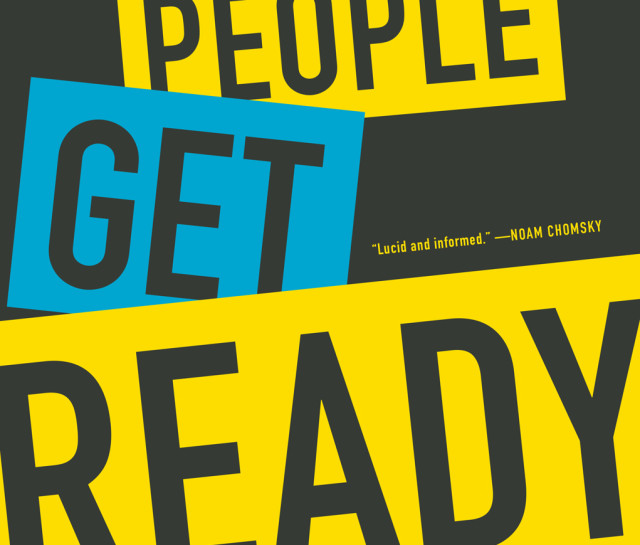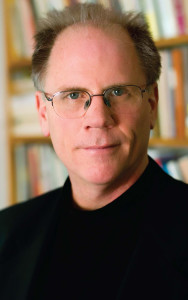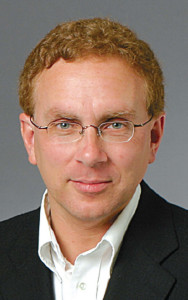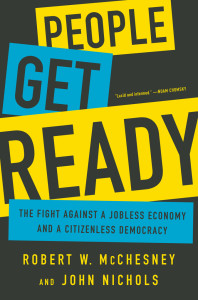
Right before scientist Gill Pratt left his post as the lead robotics researcher for the U.S. Department of Defense last August, he published a paper explaining what he sees as the coming Cambrian explosion of robotics, a moment akin to the event more than 500 million years ago where a diversity of animal and plant life exploded into existence in a relatively short period of time. In the realm of technology and robotics, as devices increasingly become capable of doing what humans do, such an explosion could mean the automation of entire industries, making workers obsolete and inequality even worse.
Although no one, including Pratt, can predict when this explosion will take place, it’s closer than ever before. Consider driverless cars, virtual assistants like Apple’s Siri and Google’s Alexa, or Tay the Microsoft chat bot who, after hours of interacting with other users on Twitter, began spouting racist, hateful and conspiratorial ideas in late March. And these are only the technologies making their way into headlines.
To put it more succinctly, “We are not in charge,” write coauthors Robert McChesney and John Nichols in their new book People Get Ready: the Fight against a Jobless Economy and a Citizenless Democracy. “… Every decision that matters about our lives is being made by a corporate CEO or a campaign donor or a programmer or a hacker or someone else that we have never met.”
By exploring the impending technological revolution in the context of our current economic and political environment, McChesney and Nichols assert the increasing automation of our economy, coupled with the corporate takeover of our government, will have profound implications for society if left unchecked.

“At that point we have to rethink the economy so that technologies and the benefits we have don’t work to punish people — make their lives miserable — but rather work to enhance all our lives,” McChesney says. “And that’s the great political struggle.”
McChesney is a professor of communication specializing in media history, policy and social change at the University of Illinois Urbana-Champaign. And Nichols is a veteran national affairs correspondent for The Nation and associate editor of The Capital Times in Madison, Wisconsin. The two met while both appearing on a public television show in 1996, as apparent adversaries given McChesney was a renowned media critic and Nichols a budding journalist. In reality, the two more or less saw eye to eye and have worked together ever since. People Get Ready is their sixth book.
With their most recent work, the coauthors were formulating an entirely different book, McChesney says, when Nichols returned to the U.S. after a telecommunications conference in Germany in the middle of 2014. Nichols observed that most of the experts spoke about automation and robotification of industries, and agreed it was a fast-approaching inevitability. What became increasingly apparent from these discussions was the displacement of thousands if not millions of workers by technology, which carries the potential to drastically change our entire culture in a rather short period of time.
“Generally, [there was] a sense that somehow it would just work itself out,” Nichols says. “I just didn’t buy that. … I don’t believe there is an app that is going to make it all better.”
Returning home, the lack of dialogue surrounding this very topic in the U.S. political conversation left him in awe.
“I was so powerfully struck by the notion that none of our political leaders seemed to be talking about it and none of our media elites were talking about it,” Nichols says. “There was no popular discourse about what everybody says is going to be one of the most radical transformations for humanity since the industrial revolution.”
So the authors began researching — pulling together economic theory, political history and technology experts, as they watched the unfolding 2016 presidential election and the average citizen’s reaction to it. Writing throughout last summer and into the fall, McChesney and Nichols didn’t necessarily expect candidates such as Donald Trump and Bernie Sanders to make it as far as they have. But they knew the growing inequality, combined with the corporate influence and dominance of the American political system, would eventually lead to a tipping point of citizen unrest.
“We wrote the book really anticipating a political moment coming in the fairly near future where growing inequality, growing unemployment and underemployment, all sorts of issues of democratic decline and economic stagnation, were going to be huge issues,” McChesney says. “But we didn’t quite anticipate that it would happen this quickly.”

“There were logical conclusions that extended from our research,” Nichols adds. “When you have changes this radical, when you really do move into a new age, in an industrial sense, in an economic sense, in a social sense, people are going to get shaken by that. … The people themselves are rocking the political process, they are pushing and pulling and making demands on it because they can feel the changes that are taking place and they are trying to assert themselves.”
It’s not about curbing technological progress in the hopes of maintaining society as we know it, McChesney and Nichols argue. It’s about recognizing the impending change and making smart decisions regarding it.
“We barely bother to think about what it all means,” the authors write. “This limits necessary questioning about whether we have the wherewithal and the authority to accept good change, reject bad change, and forge our own change.”
And this is where a strong democracy comes in for McChesney and Nichols. A democracy where corporate lobbying and financial influence aren’t dictating the decisions made in Washington. Where voter turnout reaches 70 or 80 percent, rather than hovering just around 50 percent. Where our social infrastructure functions in a way that people can manage the technological transition successfully.
“If we don’t couple technological progress with real democracy we run the real risk of ending up in a situation where everything about our lives has been transformed but we’ve had very little say in it,” Nichols says.
“If you have a strong democracy — get rid of corruption — you can solve any problem in the most humane and rational manor possible,” McChesney adds. “If you don’t have a strong democracy you are on a very slippery slope in times of crisis.”
McChesney seems aware some of this may come across as alarmist. But he also believes the survival of our species and intelligent life is at stake, which necessitates the seriousness of the authors’ statements. Their goal isn’t to scare people with thoughts of a dystopian future. Rather, People Get Ready seeks to alert people to their role as citizens capable of addressing the issues at hand.
“The good news is that we have the capacity now to actually solve the problems and create a world that is extraordinary. Not perfect, but democratic, fair, just, extraordinary,” McChesney concludes. “Or we have the possibility to go very much in the current direction we are going in, which is greater oligarchy and inequality and lack of democracy with all the attending problems growing worse. Those are the choices we face.”

Robert McChesney and John Nichols. 7:30 p.m. Thursday, April 14, First Congregational Church of Boulder, 1128 Pine St., Boulder, 303-442-1781. 7:30 p.m. Friday, April 15, Alliance Center, 1536 Wynkoop St., Denver, 303-405-6780. Tickets $15 in advance, $20 day of.














